I have a equation
inv = (x + f) (y + g) == z;
But for some reason I cannot CountourPlot it, even though copy-pasting output, for example {(2 + x) (2 + y)} == {11} into CountourPlot works. I've tried both Hold and Defer to no luck.
What's happening and how I can fix this problem?
Actual code:
inv00 = (x + 1) (y + 1) == z
inv01 = inv00 /. {z -> 2}
ContourPlot[inv01, {x, 0, 1}, {y, 0, 1}]
ContourPlot[(1 + x) (1 + y) == 2, {x, 0, 1}, {y, 0, 1}]
